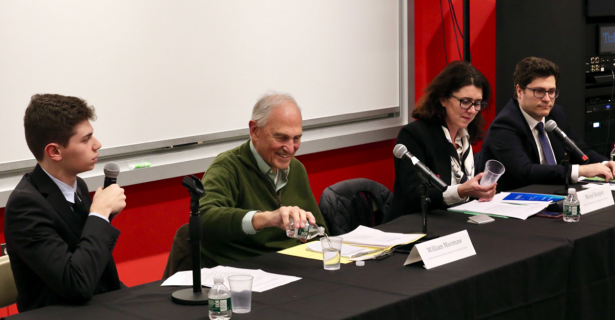On November 20th, Tufts European Horizons hosted its first panel of the semester on the European Green New Deal and its implications for international institutions, economic growth and climate change. The expert panel featured Fletcher School Professor emeritus William Moomaw, Harvard Kennedy School Professor Muriel Rouyer, and Juergen Braunstein who is a fellow at Harvard Kennedy School’s Belfer Center.
The discussion explored how the incoming European Commission President, Ursula Von der Leyen, has grasped the willingness of the European population to adopt more stringent environmental policies to deal with the current climate emergency. The panelists also acknowledged successful policy in the US, particularly in the sphere of local politics.
In his introductory remarks, Professor Moomaw explained his unique take on the Green New Deal; the proposal is not just an environmental agreement, rather it is an agreement which addresses the problems within our economy while simultaneously incorporating sustainable principles. Similarly, Professor Rouyer explained that the need to address those most negatively impacted by a move towards a more sustainable economy will require new socio-economic policies and an integration of moral values in policymaking. Finally, Juergen Braunstein discussed the impact that this deal will have on global trade with carbon taxes and on geopolitics by shifting power away from oil producing countries.
This event links to Tufts European Horizons’ mission to give young people a voice in shaping the future of Europe and of transatlantic affairs through discussion of European political, economic, and social affairs in a variety of events on the Tufts campus. The student group organized similar events in its first semester, which looked to compare and contrast European and American perspective on core issues such as data privacy and immigration.
Co-presidents Julia Mioduska (A’21) and Guillaume Pailhoux (A’21) will look to continue to create a space for a dialogue on the importance of the US-EU relationship and to organize productive discussions that help students become more informed and express their opinions on the future of the European continent.

